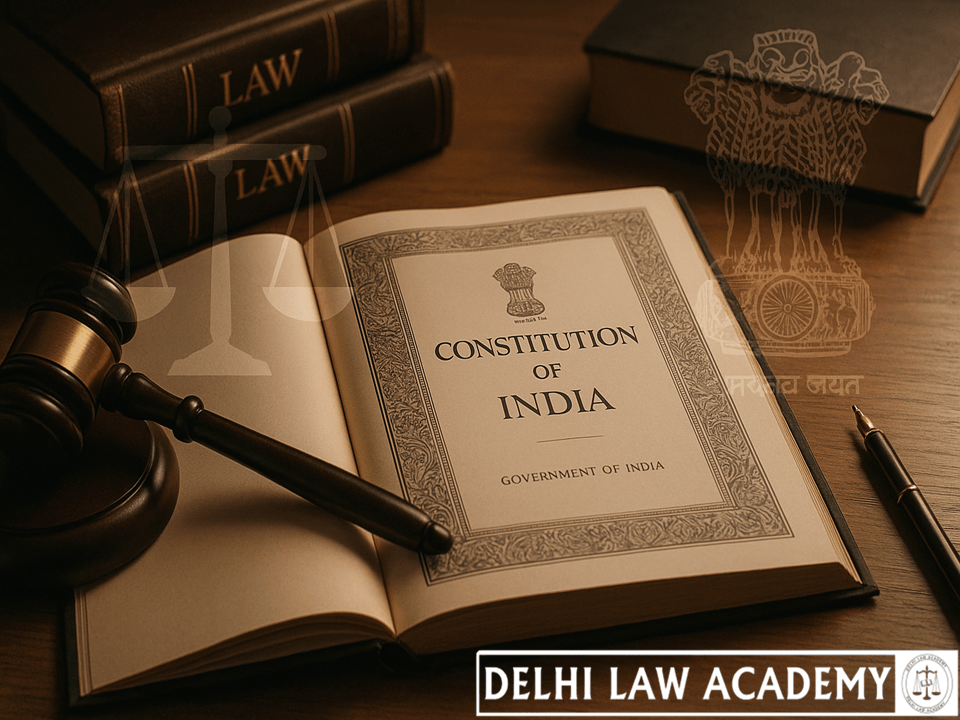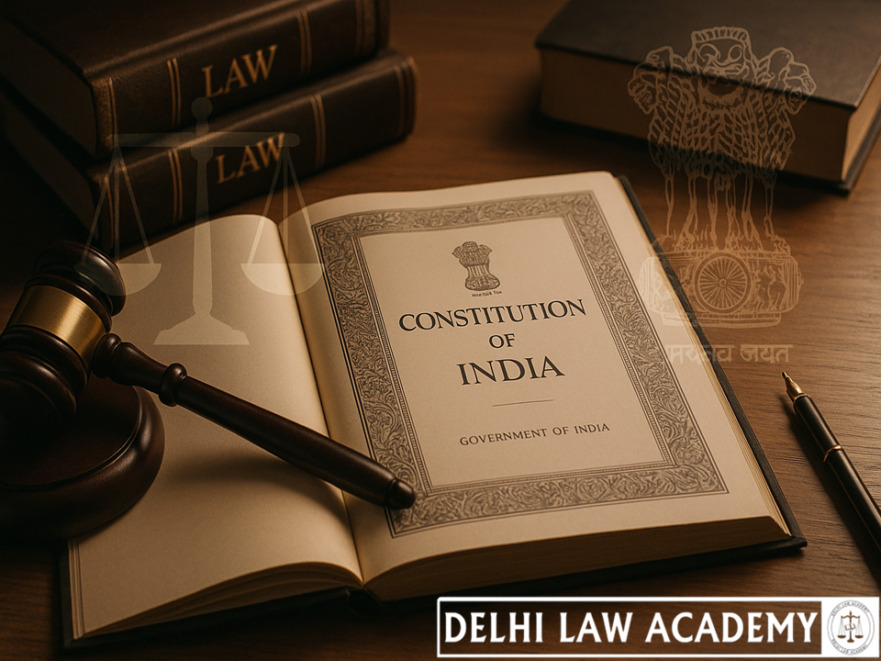
📘 FUNDAMENTAL RIGHTS — ARTICLES 31A TO 35
For RJS, DJS, PCS(J) and other Judicial Service Exams | Delhi Law Academy Jaipur
⚖️ Constitutional Notes for Judiciary Exams
Presented below is the original text exactly as provided, with styling for clarity and emphasis.
Topics: FUNDAMENTAL RIGHTS • Acquisition of Estates • Validation of Acts and Regulations • Precedence to some DPSPs • Right To Constitutional Remedies • Restrictions of Fundamental Rights • Martial Law • Laws to be made by Parliament only Delhi Law Academy Jaipur presents below for aspirants of RJS, DJS, PCS(J) and other Judicial Services throughout India a short Note on the provisions of Article 31A to 35 . ****************** FUNDAMENTAL RIGHTS ACQUISITION OF ESTATES Article 31A • A law providing for acquisition by State o of any estate or of any rights therein • shall not be void o even if it takes away or abridges rights conferred by Article 14 or 19 • A law providing for taking over o of management of any property by State for a limited period o in public interest or to secure proper management of property • shall not be void o even if it takes away or abridges rights conferred by Article 14 or 19 State law requires Presidential assent • If such law is made by State Legislature: • to get benefit under this article o it should have been reserved for consideration of President and o should have received his assent Land under personal cultivation • Where a law provides for o acquisition of any land held by a person under his personal cultivation • it should provide for o payment of compensation o at a rate which shall not be less than market value Validation of Acts and Regulations Article 31B • An Act or Regulation o specified in the Ninth Schedule • shall not be deemed to be void o even if it is inconsistent with or takes away or abridges o any of the rights conferred by Part III Current Legal Status of Ninth Schedule • Landmark Supreme Court Judgment on article 31B: o IR Coelho v. State of TN [2007 SC] Decision • All Acts and Regulations o included in Ninth Schedule after SC decision in Keshavanand Bharti case [after 24th April 1973] • would have to be tested on the touchstone of basic structure doctrine o for determining their constitutional validity Precedence to some DPSPs Article 31C: As inserted originally by the 25th Amendment: • A law o giving effect to the principles laid down in articles 39(b) and (c) • shall not be void o even if it takes away or abridges rights conferred by Article 14 or 19 Amended Article 31C: As amended by the 42nd Amendment: • A law giving effect to any of the DPSPs • shall not be void o even if it takes away or abridges rights conferred by Article 14 or 19 Current legal status • Landmark Case Law on Article 31C o Minerva Mills v. Union of India [1980 SC] Decision • Changes made in article 31C by the 42nd Amendment o were held to be unconstitutional • Original article 31C o was held constitutionally valid Second clause of Article 31C • Law declaring that o this law is for giving effect to the principles laid down in articles 39(b) and (c) • shall not be called in question in any court o on ground that it does not so give effect Current legal status • This provision has been held unconstitutional o in Minerva Mills case • as it militates against the basic feature of judicial review State law requires Presidential assent • If such a law is made by State Legislature: • to get benefit under this article o it should have been reserved for consideration of President o and should have received his assent RIGHT TO CONSTITUTIONAL REMEDIES Article 32 • The right to move the Supreme Court o for enforcement of rights conferred by Part III o is guaranteed • Supreme Court has power o to issue directions, orders or writs o for enforcement of any of the rights conferred by this Part Note: • This Article was described by Dr Ambedkar as the “heart and soul” of our Constitution. ***************** Restrictions of Fundamental Rights Article 33 • Parliament may, by law, restrict or abrogate o any right conferred by Part III • to ensure o proper discharge of duties and o maintenance of discipline for members of armed forces members of public order maintenance forces persons in any intelligence or counter-intelligence organizations persons in telecom services for these forces and organizations Enactment under this article: • Police Forces (Restrictions of Rights) Act, 1966 Scope: • This article empowers Parliament o to restrict or abrogate application of Fundamental Rights o for armed forces, paramilitary forces, police, etc. Martial Law Article 34 • Parliament may, by law, indemnify any govt servant o for any act done by him o in maintenance or restoration of order o in any area where martial law was in force Scope of article 34 • This article is primarily concerned with o granting indemnity by law o in respect of acts done during operation of martial law • It does not authorize proclamation of martial law Laws to be made by Parliament only Article 35 • Parliament shall have power to make laws o under articles 16(3), 32(3), 33 and 34 • but State Legislatures shall not have such power • Parliament has power to make laws for prescribing punishment o for acts declared as offences in this Part [articles 17, 23] • but not State Legislatures *********
📚 For complete Constitution & Fundamental Rights notes, visit Delhi Law Academy
📚 Continue Your Constitution of India Preparation
Don’t stop here! Strengthen your knowledge of the Fundamental Rights with our other related blogs:
📘 Stay Ahead with Delhi Law Academy!
Get access to free monthly current affairs, read our insightful blogs,
and explore free study resources prepared by experts at DLA Jaipur. 🚀
💬 FAQs — Fundamental Rights (Articles 31A to 35 of the Constitution)
Answers to common long-tail search questions about Articles 31A to 35 — including Acquisition of Estates, Ninth Schedule, DPSPs, and Right to Constitutional Remedies. Designed for RJS, DJS & PCS(J) aspirants.
It ensures agrarian reforms and public interest measures are not struck down for violating equality or freedom rights.
Search phrase: “Article 31A acquisition of estates meaning and explanation”
However, as per IR Coelho v. State of Tamil Nadu (2007), all laws added to the Ninth Schedule after April 24, 1973 are subject to the Basic Structure Doctrine.
Search phrase: “Ninth Schedule Article 31B explained IR Coelho case summary”
In Minerva Mills v. Union of India (1980), the Supreme Court struck down the 42nd Amendment’s extension of this protection to all DPSPs, holding it unconstitutional.
Search phrase: “Article 31C Minerva Mills case summary DPSPs vs Fundamental Rights”
Dr. B.R. Ambedkar called it the “heart and soul of the Constitution” because it ensures the protection of citizens’ rights through writs and judicial intervention.
Search phrase: “Article 32 heart and soul of constitution by Dr Ambedkar meaning”
Example: The Police Forces (Restriction of Rights) Act, 1966.
Search phrase: “Article 33 restriction of fundamental rights of armed forces explained”
It also gives Parliament the authority to prescribe punishments for offences like untouchability (Article 17) and forced labour (Article 23).
Search phrase: “Article 35 who can make laws parliament only explanation”
📚 For detailed notes on Fundamental Rights & Constitution, visit Delhi Law Academy
Contact us
📍 Delhi Law Academy – Jaipur Branch
6C, Tower 2, Coaching Hub, Pratap Nagar, Jaipur – 302033
📞 Phone:
+91 9911916552
+91 8447285606
✉️ Email:
contactus@delhilawacademy.com

